Legend of the Five Rings – Honour Running
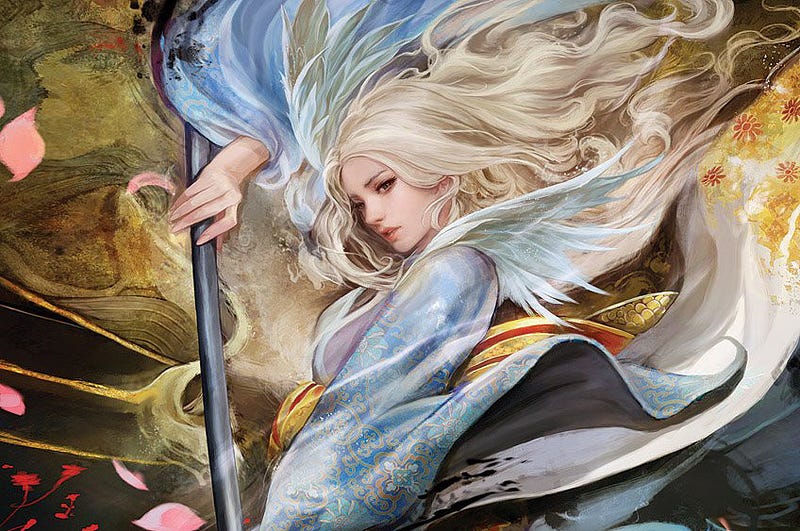 Doji Hotaru of the Crane clan
Doji Hotaru of the Crane clan
Honour running in the old game primarily meant buying high personal honour personalities for full and using honour producing holdings to rush to victory. You could test your deck by playing the game without an opponent and checking which turn you won on. This set the clock, the number of turns your opponent had to stop you from winning. It focused on a very defensive strategy to keep that clock ticking while your opponent tried to slow it down. In the new version of the game, the honour victory has remained, but pretty much everything else has changed. We know that once you get to 25 honour, you win the game, but how you get there has very much changed. In this article, I’m going to talk about the various ways to gain honour we have seen so far, how they can be used with the goal of an honour victory, and what that means for the honour playstyle in the game.
From the spoilers, we can see three primary ways of gaining honour.
- Draw fewer cards during the draw phase than your opponent. The lowest bidder gives honour points, equal to the difference between the two bids, to their opponent.
- Win an air conflict when attacking. The air ring allows you to gain two honour or to take one honour from your opponent.
- When one of your honourable characters are discarded you gain 1 honour.
1. Honour from the draw phase
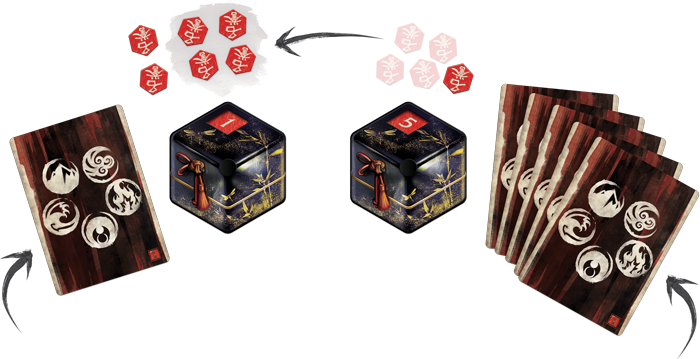
After the Dynasty phase, when characters are been recruited, you start the Draw phase. In the Draw phase, you decide how many conflict cards you will draw during the phase. You secretly set your dial to a number between 1 and 5 showing the number of cards you wish to draw and then you and your opponent both reveal dials at the same time. While drawing cards is good, this comes at a cost. If you set your dial to a higher number than your opponent then you will lose honour equal to the difference and your opponent will gain that amount of honour. As such, for an honour deck, there is a strong incentive to draw only one card during the draw phase.
If you choose to bid to draw 1 card and your opponent bids to draw 5, you will gain 4 honour each turn. You start around 10 (so far we’ve seen Crane at 11 and Lion at 12) and to win you need 25 honour, so you should win in 4 turns! If you were playing the opposing deck, would you bid 5 on the fourth turn? Probably not, you’re more likely to bid 1 and stop the honour flow. Indeed, decks start around 10 honour they will lose the game on turn 3 through dishonour if they keep bidding 5. Although we have yet to actually play the game, current speculation suggest that decks focused on destroying provinces will draw 5 cards on the 1st and 2nd turn to maximise their conflict options early on, but would then drop to 1 card a turn for the rest of the game to stop the honour flow. This will be an 8 honour gain in total from the Draw phase leaving around us 5 to 7 honour short of our target of 25.
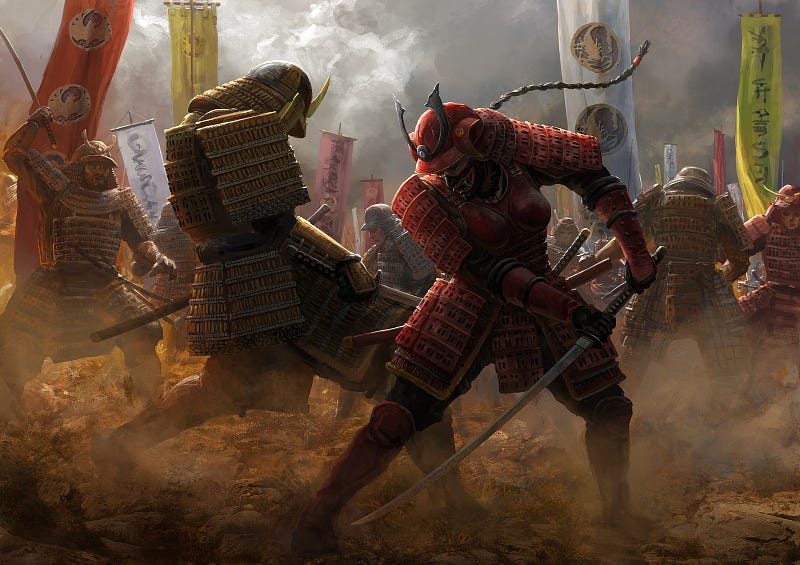 Looks like the Scorpion player had more Conflict cards than the Phoenix Player
Looks like the Scorpion player had more Conflict cards than the Phoenix Player
Not drawing cards is going to limit your options. It will make it harder for you to win conflicts. Can a deck survive with so few conflict cards? With a 4 card starting hand and 1 card each turn, over a long 6 turn game you will see only 10 cards or 25% of the deck. This puts honour decks in a bit of a bind, they need card draw to win conflicts but also need the honour gain from the draw phase. This would increase the value of any card effects that draw conflict cards without costing honour. It may also force honour decks into drawing more cards during the Draw phase than they wish. As the Draw phase comes after the Dynasty phase both players will be able to see the current board state and will be able to judge how the Conflict phase is going to play out. While drawing fewer cards during the Draw phase will gain honour, losing conflicts due to a lack of conflict cards could negate any such benefit. This may then force a choice, is it worth losing one honour point if it will help you win a conflict? For the honour deck then, the Draw phase becomes an unreliable source of honour. While it is a nice boost, there must be other ways to gain honour and the deck needs to be able to win conflicts.
2. Honour from winning conflicts
 Air — Take one honor from your opponent or gain two honor from the token pool.
Air — Take one honor from your opponent or gain two honor from the token pool.
One of the most reliable ways to gain honour we have seen so far is to win a Conflict for the Air ring as the Attacker. This gives us the option to gain 2 honour or to take 1 honour from our opponent. Only one Air Conflict can be declared each turn, so we can gain no more than 2 honour per turn from this ring. To get this benefit we need to be able to claim it, our opponent may choose to deny it to us by claiming it first. We also need to win the Conflict, something our opponent will be encouraged to defend against and stop. The Ring of Fire which can honour or dishonour a character is also one we will need to win through a conflict, the benefits of which we will discuss later. In the previous game, characters entered battle only to stop attackers from destroying provinces, as such weak characters who were able to interfere with the attack were optimal. The defender didn’t need to win the battle, just make sure the province wasn’t destroyed. In the new game, the numbers will be important. Indeed, as the honour focused deck will be limited in Conflict cards, the numbers might be more important that for other decks. Currently, there appears to be three approaches when trying to win Conflicts:
- Focus on the Military skill, this is something the Lion and maybe the Unicorn and Crab will do.
- Focus on the Political skill, this is something the Crane and maybe the Scorpion will do.
- Spread evenly between both skills and win whichever your opponent is weakest at, this is something the Dragon will do.
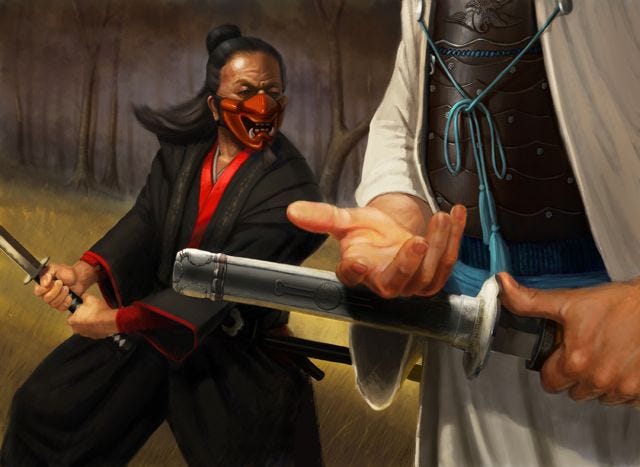
A Scorpion Samurai faces a Crane Samurai in a duel
During the recent Reddit AMA, we were told that the duelling system will be similar to the draw phase where players use the bid dial to pick a number between 1 and 5. The bid amount is then added to the relevant Skill the highest total determines the winner of the duel. As with the draw phase, the individual with the highest bid gives the difference in the bids as honour to their opponent. This gives the honour deck another opportunity to gain honour. Early in the game, this provides an opportunity for the honour deck to gain easy honour as they can bid low and lose the duel. Later in the game, the honour deck is likely to win the duels as their opponent is unable to risk bringing the honour deck closer to an immediate victory, so both sides will be likely to choose a bid of 1. Characters that have duelling based abilities or abilities that influence the bid mechanics could prove beneficial for this. The already spoiled Scorpion Manipulator character who can add 1 to a dial after bids are revealed allows the owner to bid low for honour but increase it if winning the duel is the goal.
3. Honour from honourable characters

The most recent reveal from Fantasy Flight Games included details of the honoured card. We assume the dishonoured status is the reverse. For the honour deck, the key part is that you gain 1 honour when your honoured character leaves play.

Add this characters Glory to it’s Military and Political Skill. Forced interrupt: When this character leaves play – gain 1 honour.
Initially, there would seem to be a benefit in churning out Characters with no fate tokens as you want as many Characters dying honourably as possible. If we were able to quickly honour 4 Character every turn this would make some sense, but the primary way to honour Characters we have seen so far is to win a Fire conflict. To do this, characters need to be on the board rather than dying every turn. It is probably optimal for 3 or 4 honoured Characters to die at the end of the same turn, maybe 4 to 5, pushing the honour deck over 25. This keeps them on the board until the deck is about to win. While it is important for honour decks to win conflicts it is not necessary that provinces are broken, we just need to equal or beat the enemy force. This lowers the skill requirement slightly and allows the honour deck to spread itself out slightly more. The honour deck may prefer to go second forcing the opposing deck to over commit in its first attack allowing the honour deck to split its subsequent attacks and win a Military and Political conflict.
 Sample 2 Glory characters
Sample 2 Glory characters
Characters with high glory maximise the effort of keeping them honoured as stats are increased in addition to the honour gain. So far we have seen Brash Samurai, Isawa Masahiro, Shinjo Outrider, Togashi Initiate, and Yogo Hiroue at 2 glory. They will each gain 2 Military skill and 2 Political skill when honoured which, considering the typical stats, is an impressive boost. This boost will also help us win those conflicts, so there is a bit of a feedback loop. To honour characters we need to win Conflicts and honoured characters help us win future Conflicts. Of those, the Brash Samurai and Togashi Initiate are especially notable as they have ways to honour themselves. Similarly, the Savvy Politician, although only 1 glory, can honour another character when they are honoured, effectively doubling the benefit. In a sense, they could be considered to have a ‘gain 1 honour when they leave play’ printed on them.
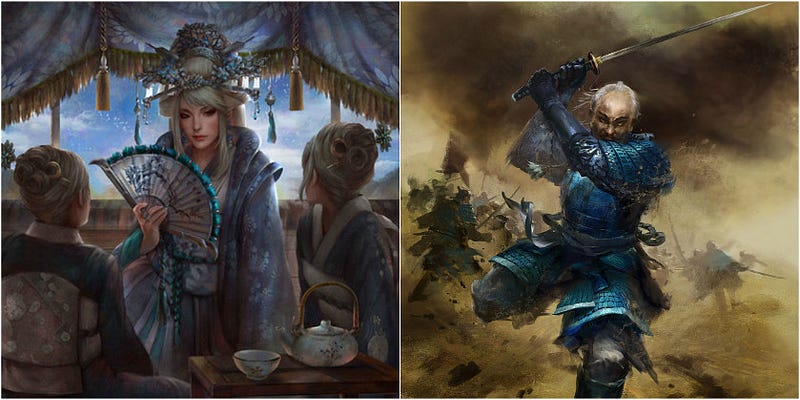 The Art for Savvy Politician and Brash Samurai
The Art for Savvy Politician and Brash Samurai
High Glory characters do also provide a weakness. It is likely an opponent will attempt to deny the honour deck the bonus of the Fire ring by claiming it themselves. If they should win a Fire Conflict they may choose to dishonour one of our 2 Glory Characters. In addition to providing a 1 point honour loss when they are discarded, they will also suffer a 2 point penalty to both their Military and Political skill making them less effective in battles. Effects such as the Scorpion Clan’s Young Rumormonger’s ability which can control which Characters are honoured or dishonoured may prove important for this. The effect limits the benefit by moving the honouring or dishonouring effect from a high Glory Character to a low Glory Character. Conversely, if there should be a card which requires you to have a dishonoured Character or has dishonouring a Character as a cost then having a Character with 0 Glory would minimise the impact.
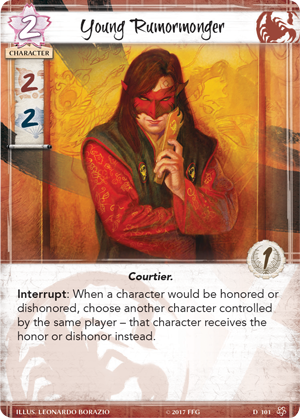
A key aspect of the honoured state is that honoured characters don’t contribute honour until they are discarded. So being on 24 honour with an honoured character is not a victory until that character is discarded. So here, having Fate tokens on the character could be a liability and winning a Void Conflict to remove the last token on your own Character could win you the game. This will add a delicate balance between keeping Characters out to win Air and Fire conflicts but only long enough to be discarded maximising honour return. Again the Young Rumormonger may be able to meddle with this by redirecting an honouring effect from a Character due to be discarded soon to a Character with more Fate tokens on them making the honour gain less likely to happen before the game ends.
Summary
The new game clock is likely to be set by decks focused on one type of conflict and crushing provinces. A Lion deck focusing on Military skill or a Crane deck focusing on Political skill should be able to break a province every turn from turn 1 onwards taking the enemy Stronghold on their first attack on turn 4. It will be up to the opponent to slow those aggressive decks down and stop them destroying the final province. In this time an honour deck is likely to have gained 2 honour each turn from conflicts in the unopposed skill for a total of 6 and a similar amount of honour due to minimal card draw during the draw phase. This will leave less than 5 honour to be gained from honoured Characters dying or from other card effects. It is also unlikely that the honour deck would be able to win two challenges in a turn, and as such would have to choose between honouring a character and gaining 2 honour. This really emphasises the importance of non-ring effects which can honour Characters.
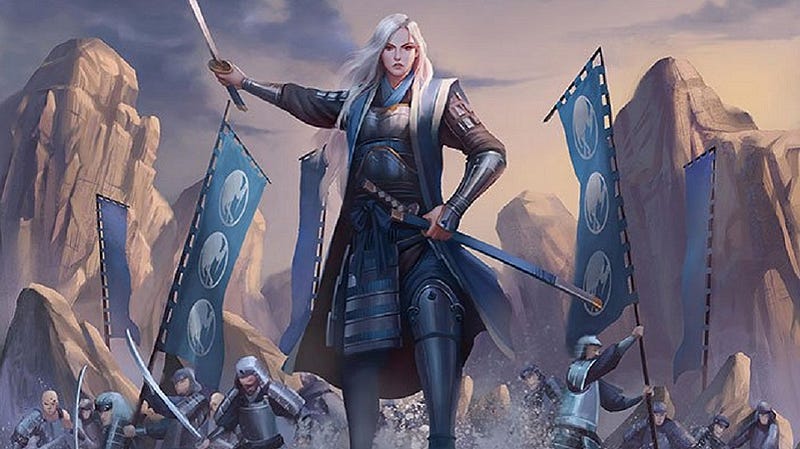 The Crane Clan go to War
The Crane Clan go to War
Should honour decks start to become dominant we may see a change in the way players approach the Draw phase. If we know the opposing deck is a strong honour deck then it might be in our interest to only bid 1 on the first turn. That will really slow the game for an honour deck. Then the game is likely to turn into a slugging match as the focus becomes who can win the most conflicts. If skill totals are low or equally matched then the ring benefits will sway the odds and eventually one deck will get the upper hand and will start taking provinces. In this way, the honour focused deck also needs to be an offensive deck able to win by taking provinces. Right now the main difference between a deck that honour runs and a deck that does not appears to be the bid during the draw phase. While having honourable personalities does generate honour it is also a very effective way to improve the Military and Political skill of your army. It most likely is going to be the actual conflict cards that really set the styles approach. Right now we only know of a dozen or so Conflict cards, so it is going to be very hard to judge. Our next Fantasy Flight Games preview is going to be an example of the conflict phase. Watch carefully for any Conflict cards that might be beneficial for an honour deck.
Bazleebub
This post first appeared on ImperialAdvisor.com all posts appear on Medium a day later.
4 Replies to “Legend of the Five Rings – Honour Running”
Hi,
Great article, being a Crane player honour gaining and using it as a win condition is of great importance to the clan! Really interesting to read the ways you have come up with to gain honor so far, and can see why 25 is the target, be interesting to see how many turns the initial honor bomb decks (if its a possible deck type to play) will be aiming for.
One point I think you missed, and might be worth noting as it is a bit different to the old CCG. From the snipit of information on gaining honour when a personality leaves play there is no indication it is clan based. So if I am Crane running some Scorpion persons, it reads that I will gain the 1 honour for the Scorpion personality leaving play!
Thanks for the great read. But no thanks for havign people think about how to beat honour 😛
AK
Glad you enjoyed it. I’m interested to see how the different clans pan out for the honour victory. I think it’s pretty clear it will be an option for Crane as we’ve seen glory interaction and they start with high honour. With the Kakita so distinctive, it would be crazy for them not to have duelling which is another feather for the honour running decks. On the other hand we’ve seen (the very small picture of) Doji Whisperer who at 1 cost for a 0/3 is the Matsu Berserker of the Crane. That Doji is going to beat down some provinces with her delicate fan and perfectly styled garden.
You’re right about the honour gain not being clan specific. We think you are only going to be able to play your own clan and unaligned characters, so Scorpion in a Crane deck might not be an option. This does still mean the unaligned characters are much better for an honour deck than they ever were before. FFG might also throw us a curve ball and give is some options!
I feel this article is pretty rigid on strategy so far. I know that honor is the goal, but if you can so easily predict what a military heavy deck will do, why not draw more cards? I also think the assumption of military players to draw 5 cards for the first two turns is, also a bit rigid. With confidence, the military player could draw 3 cards vs 5 for 2 additional turns before hitting that magic “8” honor.
Also,assuming a military deck starts with 10 honor, losing 8 honor would truly be detrimental. The military player would have to be incredibly careful not to lose 2 more honor since dishonor starts at 0. That is essentially 2 conflicts, minimum. I think we are going to see an extremely complex game, and I actually get the feeling that the long crane honor, scorpion dishonor match ups will now be the most interesting to watch.
The game is going to demand the flexibility of a switch deck in my opinion, each and every game. Being fluid and able to change your strategy will be key to this game.
Absolutely. In our last podcast, Justin talked about how this game is full of agency. Lots and lots of decisions that players can make that will impact the game.
The initial speculation about military decks wanting to draw 5 early on is based on the assumption that cards are good and if you’re willing to spend honour for them then getting them earlier is better than later. This is in no way a prediction. You are right that it leaves the deck in a precarious position where they are vulnerable to dishonour. Hovering around 3 or 4 honour might be enough to leave you outside the margin where opponents card effects will be a serious risk. Ultimately, like so many things right now, we’re going to have to see what the full card pool looks like!
Exciting times 🙂